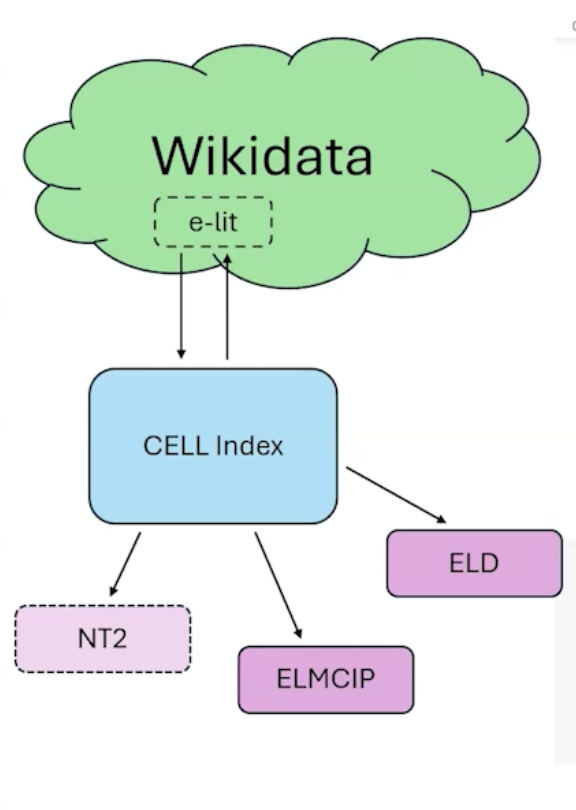CDN launches CELL, the Index
Combining the extensive reach of crowd-sourced platforms with the rigor of peer-reviewed academic databases to document electronic literature in Wikidata.

Main content
The Center for Digital Narrative at the University of Bergen is launching CELL, The Index, aiming to revolutionise digital humanities research in electronic literature.
Since its inception in 2009, CELL has had the goal of being one platform to search across several electronic literature databases. After some years of inactivity of the CELL project, the Center for Digital Narrative is revitalising this common goal as The Index.
This brings a new interface, infrastructure, and data model that will ensure longevity and lessen the burden on individual scholars. With the rise of linked open data, the collaborative, open-data knowledge graph Wikidata has been chosen.
“It is all research output. We are contributing to a larger pool of knowledge,” explains Hannah Ackermans, coordinator on The Index project, in a presentation at this year's ELO conference.
The advantages of Wikidata
"We need to take into account the weird and wonderful ways that electronic literature can break the barriers of how to document literature and art, and the very traditions of documentation in different places," said Ackermans at ELO.
Wikidata is ideally suited for this dynamic and brings along many advantages. Based on our carefully developed data model, the documentation on the Wikidata platform can be expansive. Wikidata also allows for multilingual documentation, which furthers the trend of global inclusivity in the electronic literature community.
Manually adding information that is already well-documented online is very inefficient. By integrating the crowd-sourcing capabilities of Wikidata with the quality control of a peer-reviewed database, CELL, the Index aims to significantly increase the amount of accessible information. CELL, as well as ELMCIP, is also a verified database in Wikidata, along with others such as ORCID and ISNI.
This integration expands the available data by several orders of magnitude, and with Wikidata's Q id, we give universal identifiers to works that previously have not had "the ISBN for electronic literature".
"We would like for the member databases of CELL these unique Q ids from Wikidata to refer to works of electronic literature," says Colin Robinson, CDN technologist.
“We want our research to be seen, and we want it to be useful."
Revitalising CELL
This migration revitalises CELL and provides new opportunities to make metadata about electronic literature available to a wider audience in a sustainable manner, as well as promote individual electronic literature databases who have been doing foundational work over the recent decades.
"Wikidata tries to document everything, which means our records can be seen by people and processed by bots with no prior relation to electronic literature," says Ackermans.
The project is linking different research databases to the API in The Index, which then pushes to Wikidata, maintaining updated records. Changes done directly to Wikidata are not automatically synced with The Index, but they are monitored.
This focused environment has a taxonomy that is relevant to the electronic literature community in particular. While platforms like Wikipedia and its knowledge base sister project Wikidata offer a vast amount of information – they often lack the reliability required for academic research. We bridge this gap by providing a peer-reviewed database that can be browsed alongside Wikidata, ensuring both accessibility and trustworthiness.
"This is one of the first projects that have solved this problem: How do you use something global like Wikipedia, but also make sure the data is exactly correct and only entered by researchers? Having this kind of index as the intermediary stage solves that problem," says Robinson.
Becoming a CELL member
Researchers can find and contribute to the database without being part of the system, enhancing the visibility and accessibility of digital works. The database will serve as a hub for searching specific parts of Wikidata while linking to existing databases, making it easier for researchers to find and share information.
Members in the CELL consortium match the properties and fields with the CELL Index, and match records avoiding duplicates, before exporting data to CELL, The Index. We can troubleshoot this with you.
CDN is also looking into developing a "research database as a platform", providing databases for smaller projects in electronic literature which will have full CELL Index support.
Reference
Ackermans, Hannah; Tabbi, Joseph; Pyke, Tegan; and Robinson, Colin, "(Un)Linked Open Data: Documenting E-lit in Wikidata" (2024). ELO (Un)linked 2024. 29.https://stars.library.ucf.edu/elo2024/hypertextsandfictions/schedule/29

